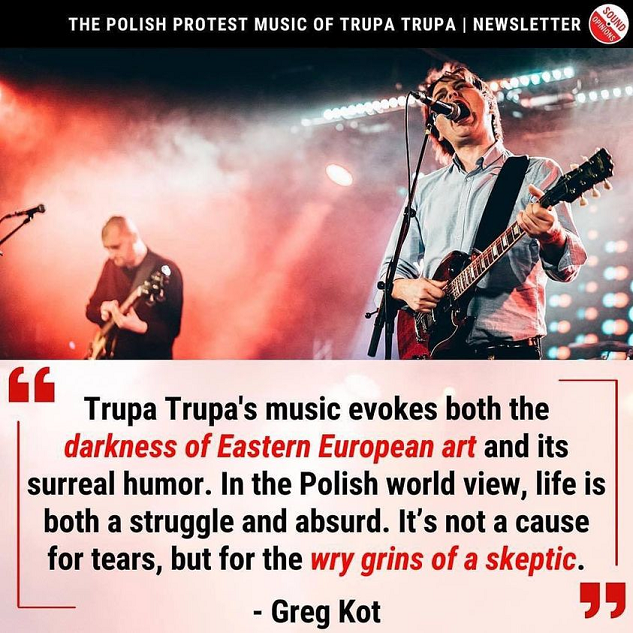As a kid growing up in a huge extended family of Polish post-World War II ex-pats and their offspring in Chicago and beyond, I didn’t have to travel to Warsaw to get a deep education in the country’s culture and music.
My earliest memories include the voices of Polish choirs and folk groups, and the stormy strings orchestrated by the pride of Krakow, pioneering composer Krzysztof Penderecki, and Henryk Gorecki. Their music filled our living room on Sunday mornings.
Conversations with aunts, uncles, cousins and grandparents inevitably dispensed with small-talk and went right to the heavier stuff as we debated everything from the existence of God to the merits of Danziger Goldwasser liqueur, aka “the golden water from Gdansk.” Even before I was an adult, I was expected to contribute my perspectives, and did my best to pretend like I wasn’t drowning, completely out of my depth.
These memories merged a few years ago when I first heard the music of Trupa Trupa, the Gdansk-based avant-psych-punk quartet fronted by a poet, Grzegorz Kwiatkowski, with whom I share a first name (when particularly pissed at me, my mom would address me as “Grzegorz!” – a sure sign that I was in deep, deep shit for some unforgivable sin like being late for dinner).
The band’s music evokes both the darkness of Eastern European art and its surreal humor. In the Polish world view, life is both a struggle and absurd. It’s not a cause for tears, but for the wry grins of a skeptic. It is a perspective forged after centuries of being treated like a punching bag while sandwiched between seasoned oppressors such as Germany and Russia.
Little wonder Trupa Trupa’s songs join a long line of Eastern European protest music, evoking Czechoslovakia’s Plastic People of the Universe and Pulnoc, Russia’s Zoopark and Pussy Riot, and Poland’s own Fugs-like provocateurs Salon Niezaleznych (Salon of Independents) and street-anthem agitators Chlopcy z Placu Broni (The Arsenal Square Boys).
Trupa Trupa’s songs aren’t preachy. Kwiatkowski chooses his words carefully, and with a minimum of syllables he evokes a mood, a sensibility. Rather than bludgeoning listeners with his opinions, he leaves room for interpretation and reappraisal. The music envelops his voice in a cloud of dread and anxiety. On the excellent new Trupa Trupa album “B Flat A,” a song such as “Uniforms” suggests a catchy yet wickedly ghostly nursery rhyme about conformity.
Conformity, or more precisely the need to subvert it, is among the topics as we interview Kwiatkowski on this week’s show. As you’ll hear, he’s not just the singer in a rock ‘n’ roll band, but a thinker, a philosopher and a historian. As is the Polish custom, there was little time for small talk as we had urgent matters to discuss.
Afterward, Grzegorz emailed his impressions of our conversation:
the atmosphere you created during this show was amazing
i felt great and safe
it was atmosphere of a great family
He would’ve fit right in at our dinner table back home.
Greg Kot


